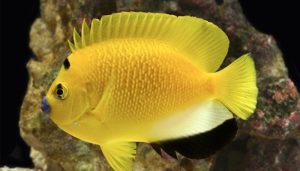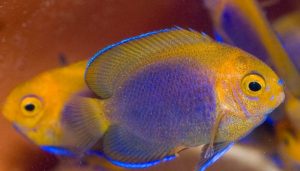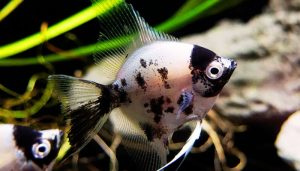Why is my goldfish attacking my other goldfish? Goldfish are popular pets known for their vibrant colors and graceful swimming. They are generally peaceful and friendly fish, but sometimes, you may notice goldfish aggressive behavior among your goldfish.
If you’re wondering why your goldfish is attacking your other goldfish, this article will provide valuable insights and solutions to this issue.
Understanding the causes of aggression in goldfish and implementing appropriate measures can help create a harmonious environment for your aquatic pets.
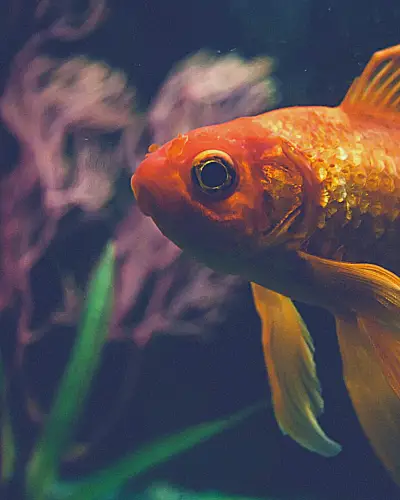
Table of Contents
ToggleAre Goldfish Considered Aggressive Fish?
Goldfish are not typically considered aggressive fish. While they may display a certain level of territorial behavior, especially during the breeding season, they are generally peaceful and well-suited for community aquariums.
However, it is essential to note that the behavior of goldfish can vary depending on their living conditions and tank mates. In smaller tanks or overcrowded environments, goldfish may become more aggressive as they compete for space and resources.
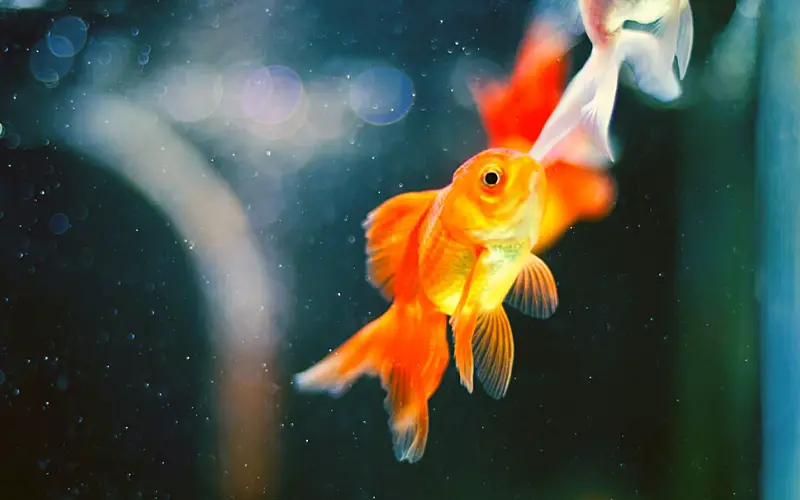
Certain aggressive fish species may also provoke goldfish, leading to conflicts and stress. Goldfish should be provided with adequate space and compatible tank mates. To ensure a harmonious aquarium environment,
Keeping goldfish with other peaceful fish species that can tolerate the colder water temperatures preferred by goldfish is recommended. In conclusion, while goldfish are not inherently aggressive, providing them with proper care and suitable tank mates is essential to avoid potential aggression.
Why Is My Goldfish Attacking My Other Goldfish?
What causes goldfish bullying? Goldfish can be aggressive towards each other for various reasons, such as territorial behavior, mating rituals, or stress. Identifying the root cause and taking appropriate steps to prevent any harm to your fish is essential.
Below, we’ll explore why goldfish exhibit aggressive behavior and how you can stop them from attacking each other.
5 Common Causes of Aggression in Goldfish
Why is my goldfish killing my other fish? Goldfish aggression can stem from several factors, including poor water conditions, mating season behavior, territorial instincts, competition for resources, and introducing new fish.
1. Poor Water Conditions
Goldfish are sensitive to water quality, and inadequate conditions can lead to stress and aggression. Factors such as high ammonia or nitrite levels, improper pH balance, and insufficient oxygen levels can contribute to aggressive behavior in goldfish. Maintaining a clean and well-filtered aquarium is essential for their overall well-being.
2. Mating Season Behavior
Goldfish may display aggressive behavior during the breeding season as they compete for mates. The Male goldfish may chase and nip at the female goldfish, displaying territorial instincts. This behavior is expected during the mating period and usually subsides once the breeding season ends.
3. Territorial Instincts
Goldfish can become territorial, especially when they perceive a threat to their space or resources. This territorial aggression can manifest when a goldfish feels its territory is being invaded or competes for food or hiding places. Establishing a hierarchy is a natural behavior for many fish, including goldfish.
4. Competition for Resources
Limited resources within the tank, such as food and hiding places, can lead to aggression among goldfish. When resources are scarce, goldfish may become more aggressive in their attempts to secure them.
Providing adequate food and creating multiple hiding spots can help alleviate the competition and reduce aggression among tank mates.
5. New Fish Introduction
Introducing new goldfish into an established tank can disrupt social dynamics and trigger aggressive behavior. When a new fish is introduced, existing goldfish may perceive it as a threat or intruder, leading to chasing, nipping, and even physical injuries.
Proper acclimation and quarantine procedures can help minimize stress and aggression while introducing new fish.
Signs of Aggression in Goldfish
To effectively address goldfish aggression, it’s essential to identify the signs indicating aggressive behavior. Here are some common signs to look out for:
– Chasing and Nipping Behavior
Aggressive goldfish often exhibit chasing and nipping behavior toward their tank mates. They may relentlessly pursue other fish to establish dominance or defend their territory. The targeted fish may experience stress and physical injuries due to this aggressive goldfish behavior.
– Fin Damage
One visible sign of aggression is fin damage. Aggressive goldfish may nip at the fins of other fish, resulting in torn or frayed fins. Fin damage can also make the affected fish vulnerable to infections and diseases like fin rot.
– Stress and Poor Health
Aggressive behavior can cause stress among goldfish, leading to poor health and weakened immune systems. Goldfish can become stressed and show reduced appetite, abnormal swimming patterns, or unusual coloration. It’s crucial to address aggression promptly to ensure the overall well-being of your goldfish.
Managing Aggressive Goldfish
How To Stop Goldfish From Bullying Other Tank Mates? If you’re facing aggression issues among your goldfish, there are several strategies you can implement to manage and reduce their aggressive behavior:
– Separate the Aggressive Fish
If one goldfish fight more than the others, consider temporarily separating it from the main tank or using tank dividers. A hospital tank or a separate aquarium can provide a safe space for the aggressive fish while allowing the other fish to recover from the stress and injuries caused by the aggression.
– Provide Sufficient Space
Goldfish require ample space to swim and establish territories. Insufficient tank size can lead to heightened aggression due to cramped living conditions. Ensure your goldfish have enough space to explore, swim, and establish their territories comfortably.
– Create Hiding Places
Offering hiding places in the aquarium can help reduce aggression among goldfish. Plants, caves, or other aquarium decorations provide refuge for fish being chased or bullied. Hiding places can break the line of sight between aggressive fish, reducing confrontations and promoting a more peaceful environment.
– Adjust Feeding Practices
Competition for food can contribute to aggression among goldfish. To minimize this, consider adjusting your feeding practices. Instead of feeding the fish all at once, try spreading out the feeding times or using feeding rings to ensure each fish gets its fair amount of food. This can help alleviate the competition for resources and reduce aggression.
– Consider a Quarantine Tank
Using a quarantine tank is advisable when introducing new goldfish or treating sick goldfish. Quarantine tanks provide a controlled environment for observing and acclimating new fish and isolating and treating sick or injured fish. This helps block the spread of diseases and minimizes aggression during the introduction process.
How can I stop my goldfish from attacking other fish?
If you notice your goldfish chasing or attacking another goldfish, there are several steps you can take to address this behavior:
– Provide enough space: Make sure your goldfish tank is large enough to accommodate multiple fish comfortably.
– Monitor water quality: Poor water conditions can stress fish and contribute to aggressive behavior, so regular water testing and maintenance are crucial.
– Remove the aggressor: If one fish consistently bullies others, it may need to be temporarily or permanently removed from the community tank.
– Introduce hiding spots: Adding decorations and plants to the tank can create hiding spots and break the line of sight, reducing aggression.
– Balance the population: If the aggression persists, consider redistributing the fish in the tank or adding more fish to dilute aggression.
What can I do to reduce aggression among goldfish?
To reduce aggression:
- Provide your goldfish with sufficient space in the tank.
- Create hiding places, such as plants or decorations, to give fish being chased a refuge.
- Adjust your feeding practices to minimize competition for food.
- Consider using a quarantine tank when introducing new fish to prevent aggression.
Commonly Asked Questions (FAQs)
How can I tell if my goldfish is aggressive?
Some signs of goldfish aggression include chasing and nipping behavior, fin damage, and stress-related health issues. Aggressive goldfish will relentlessly pursue other fish, causing physical harm and stress to their tank mates.
Can aggression in goldfish be harmful to their health?
Yes, aggression can have adverse effects on goldfish health. Stress caused by aggression can weaken their immune systems, leading to poor overall health. Physical injuries from chasing and nipping can also make goldfish more susceptible to infections and diseases.
How can I separate aggressive goldfish from the others?
You can temporarily separate aggressive species by placing them in a separate tank, often called a hospital or isolation tank. This allows the other fish to recover from the stress and injuries caused by the aggression.
Will goldfish aggression subside over time?
Aggression in goldfish may subside over time, especially if it is related to mating behaviors during the breeding season. However, if aggression persists and threatens the fish’s well-being, proactive measures should be taken to manage and minimize it.
Why is my goldfish attacking my other goldfish?
Why is my goldfish nipping at my other goldfish? There could be several reasons your goldfish is aggressive toward its tank mates. Understanding the causes of goldfish aggression is crucial to address and stop this behavior.
Can fancy goldfish be more aggressive?
Yes, some fancy goldfish varieties are known to be more aggressive than others. Aggressive varieties of goldfish like Ryukin or another type of goldfish can exhibit dominant behavior and may be more prone to fight and bully other fish in the tank.
Can goldfish play fight, or is it always aggression?
Goldfish can engage in both play-fighting and natural aggression. Differentiating between the two can sometimes be challenging, as they may exhibit similar behaviors. However, play-fighting is usually less intense, and the fish involved will not cause harm to each other. Observing the frequency and intensity of the behavior can help determine whether it is playing or fighting fish.
What are the potential consequences of goldfish aggression?
Goldfish aggression can adversely affect the health and well-being of the fish involved. Aggression can cause physical injuries and stress and even lead to weakened immune systems, making them more susceptible to diseases. It is essential to address and mitigate aggression as soon as possible to ensure the overall well-being of the goldfish.
Can goldfish aggression be a sign of illness?
Yes, aggressive behavior in goldfish can sometimes be a symptom of an underlying health issue. If you notice sudden and extreme aggression in your goldfish, monitoring their overall health and consulting a veterinarian if necessary is recommended.
Why do goldfish chase each other around the tank?
Why is my goldfish eating my other goldfish’s tail? Goldfish may chase each other around the tank for various reasons. It can be a display of dominance, courtship behavior during the breeding season, or even a result of stress or aggression. Observing the context and frequency of the behavior can help determine the underlying cause.
Can goldfish aggression be stopped?
In many cases, goldfish aggression can be successfully addressed and stopped. By assessing the causes of aggression, providing adequate space and resources, and monitoring the overall health of the fish, it is possible to reduce or eliminate aggressive behavior in goldfish significantly.
Can goldfish be kept with other fish in a community tank?
Goldfish can be kept with other fish in a community tank, but it is essential to choose tank mates wisely. Some fish species are incompatible with goldfish due to differences in temperature requirements, water conditions, or aggressive tendencies. Researching and selecting suitable tank mates is vital to maintain peace and harmony in the tank.
Conclusion
So, why do my goldfish attack each other? Goldfish aggression can be a concerning issue for aquarium enthusiasts. Understanding the underlying causes and implementing appropriate measures can help manage and reduce aggression among goldfish. By maintaining proper water conditions, providing sufficient space and resources, and addressing any territorial or mating behavior, you can create a harmonious environment for your goldfish to thrive.
You might also like
- Can Glofish Live with Goldfish? Let’s Clear Up the Confusion
- Bulging Eyes in Goldfish: 3 Major Causes & Proven Solutions
- Can Plecos Live with Goldfish? 9 Amazing Goldfish Companions
- How Long Do Fantail Goldfish Live: (The Shocking Truth)
- 7 Compatible Goldfish Mates That Don’t Eat Each Other!
- Why Are Fantail Goldfish Aggressive: 7 Shocking Causes & Fixes!
- Why Does My Fantail Goldfish Swim Upside Down: (Solved)
- Goldfish Diseases: 10 Quick Fixes for Your Sick Goldfish!


